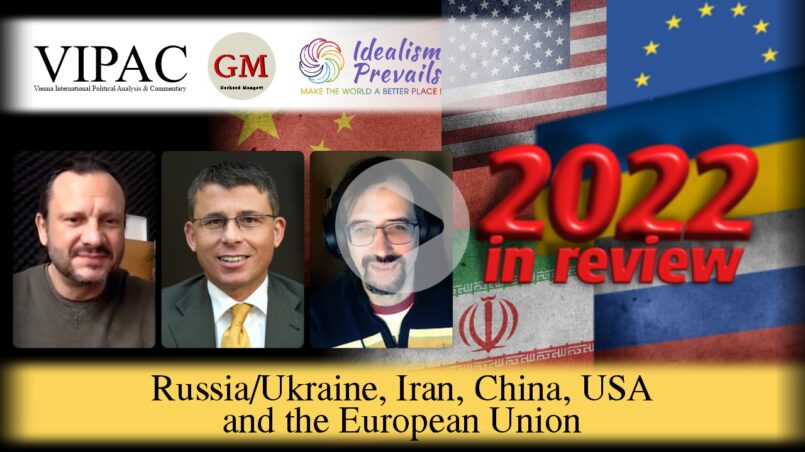2022 in review with Prof. Dr. Gerhard Mangott: Russia/Ukraine, Iran, China, USA and the European Union

In our latest VIPAC-GMA-Idealism Prevails podcast Alexander Stipsits and Christian Janisch discuss the year 2022 in review with political scientist Univ. Prof. Dr. Gerhard Mangott.
Our first topic is of course the war in Ukraine, that was started by
Russia´s President Putin on February 24th 2022 and that has led – if the current German chancellor Olav Scholz is to be believed – to a “Zeitenwende”.
While most Western experts had thought Ukraine will fall just within a few days, Ukrainians proved them wrong.
One of the major positive suprises in 2022 was how bravely Ukraine President Volodymyr Zelensky, the Ukrainian army and Ukraine´s people have reacted to Russia´s all at war against it´s country. Instead of fleeing the country Selenskyj remained in Kiev, rallied Ukraine´s military and captured the imagination of his people and the free world by defending Ukraine´s democracy. Rightly so Volodymyr Zelensky was recently named “Person of the Year 2022” by the TIME magazine.
Currently the military frontline in the East and south of Ukraine are stable, but the fighting continues to be fierce especially around the city of Bachmut. Based on the current military situation, it is unlikely that either Russia or Ukraine will gain the upper hand on the battlefield, therefor Prof. Mangott predicts that Russia´s war in Ukraine will continue for quite some time.
Unfortunnately there is no realistic pathway for peace negotiations at the moment, as Russia and Ukraine have both articulated political positions that are unlikely to be accepted by the other side
Iran’s support for Russia’s war in Ukraine will continue regardless of the social and political unrest that has taken place in Iran for months now. Whether there will actually be a change in Iran’s political leadership this time is to be hoped for, but not very likely in the short term. Nevertheless Iran´s younger generation is no longer willing to live under an autocratic regime.
In the long run, this should have a positive impact on Iran, Prof. Mangott explains.
2022 also turned out to be a challenging year for China, since it´s foreign trade has plummeted massively in 2022. In addition, the Zero Covid policy proved to be a major political boomerang, since civil society protests took place in numerous places in China. China´s leadership – in a suprising move for most Western observers – decided to end it´s Zero Covid policies and it´s gruesome lockdown measures to secure political stability within the country.
A lot has also been talked about the future of Taiwan in 2022. Once Russia invaded Ukraine, the question was which political lessons Xi Jinping would learn from the fallout
of the Ukraine war with regard to Taiwan. After House Speaker Nancy Pelosi had visited Taiwan in late July 2022 China reacted very aggressively and held very large military drills around Taiwan for weeks in order to intimidate the small country.
Prof. Mangott estimates that a Chinese attack on Taiwan is unlikely, because the Biden administration ended it´s policy of strategic ambiguity towards Taiwan and President Biden himself made it very clear that the USA would come to Taiwan´s military defence if the Chinese military would attack. The Taiwan issue also serves as a welcome distraction for Xi Jingping whenever there are difficult domestic problems within China.
Other important topics in our year in review interview with Prof. Mangott are the following:
the US midterm elections and it´s implications on the 2024 US Presidential Election,
the state of and threats to democracy in the USA and the role of the USA in the world,
the corruption scandal(s) within the institutions of the European Union and the EU in a multi-crisis mode, due to the failure of many European governments to address the pressing problems of our times (migration, high cost of living, inflation, etc…).
The looming question of the years to come is:
Will there be more nationalism or more international cooperation in the future?
As it currently stands, the answer may not be too pleasant, Prof. Mangott explains, but there are always also reasons for hope, so we shall see…
